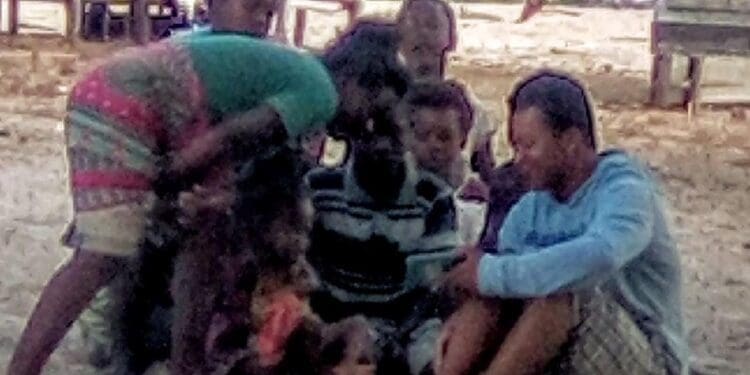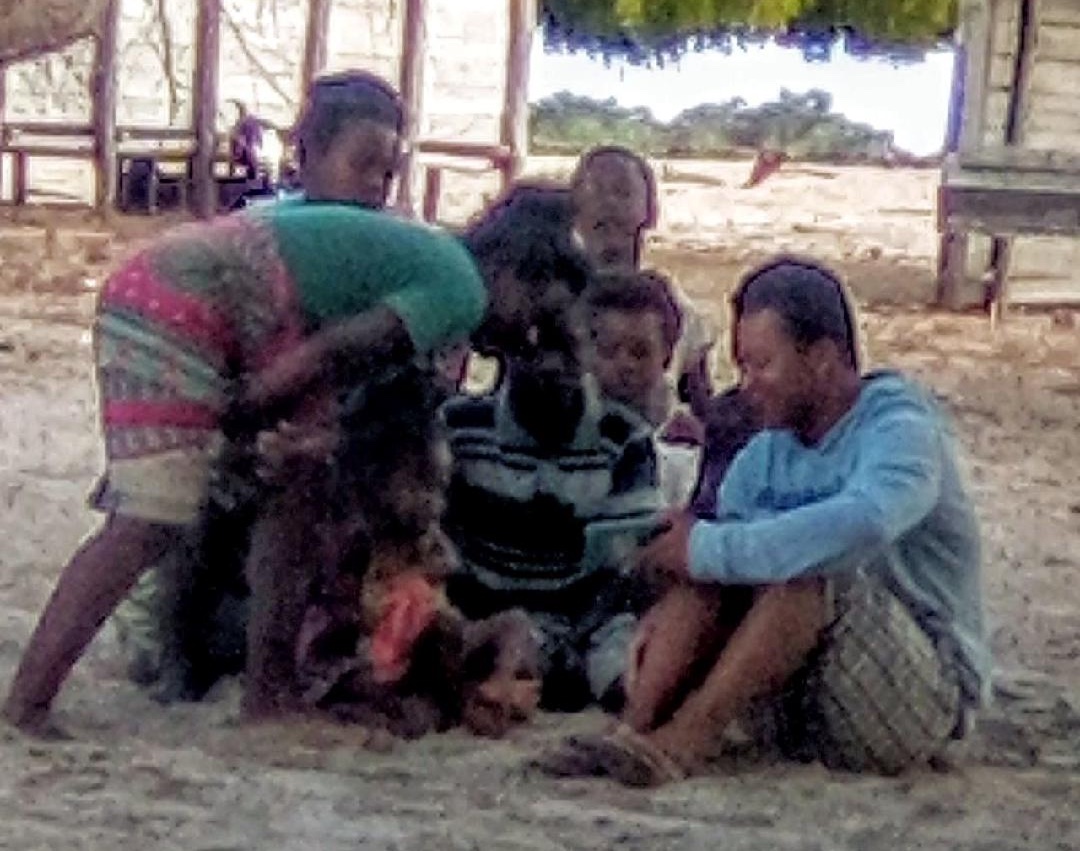Had a good time in Madagascar. Like other countries in Africa I’ve been in – if you consider Madagascar as part of Africa – there are lots of natural resources here – fish, fruit, vanilla, rosewood, rice, salt and an array of minerals. It’s size is bigger than California and smaller than Texas, with about the same population as Texas (30 million).
The country is sparsely populated in much of its interior area from the capital Tana in the center to the western coast on the Mozambique Channel which divides Madagascar from Mozambique. The coastal areas have population centers, with lots of country in between with no people. That’s my impression from driving from Tana to Morondava, and then flying back from Morondava to Tana.
Like Ecuador, the coastal small boat fishermen here say that foreign trawlers – apparently Chinese boats – are scooping up the fish and they’ve seen their near shore catches steadily decline. We had a hard time just getting a few fish from the fishermen we worked with to dI o salting demonstrations, even coming up empty in Morondava looking for suitable fish in the markets on our last session. I got home on Tuesday and there was an article about trawling and the Chinese as one of the first things I saw in our local news.
Malagasy fishermen primarily use dugout canoes with outriggers and a sail and paddle to fish. They paddle the canoe when they aren’t at sail, and when they are at sail, use the paddle as a rudder to steer. They are, as a people, master mariners- even the women and kids.
As I concluded my workshops in the third community I worked in, I had my doubts that any fishermen would take my advice. But it’s very hard to know just parachuting in here, as my Peace Corps friend Jeff Langholz calls it, and not being around long enough to know if catches are better at other times of the year, or not.
I had dinner with an embassy worker last night I met on the flight to Madagascar. Doesn’t matter from what country, really. He and I discussed Madagascar. When we talked about tipping for services, he seemed relieved when I told him I usually tipped at 50 to 100%. He said it’s one reason he doesn’t like going out with his embassy co-workers, who mostly all make over the equivalent of $100,000 US dollars and have their luxurious housing paid for, because they “caution” him about tipping too much because then “everyone will expect that of us”. It reminded me of a veteran fishery manager in Alaska who cautioned me about making a website for trollers so they could get opening information at any time because then the fleets he managed would expect that of him …. as they should. Anyway, this isn’t like tipping $50 for a $40 meal. This is tipping $1.25 for a $1.25 meal. My new friend grew up in a rural area and a minority in his home country, and he said he didn’t really fit in at his embassy because money “had no value” to him. Nice to meet a kindred spirit so far from home. Although, of course, it’s easy for both of us to say money has no value when we have plenty of it – at least enough to meet all our needs and then some. And we’d both acknowledge that.
I have to say I did get some comeuppance this morning. I’m staying at a different Radisson than the Radisson Blu I stayed at, and can see from this one, in Tana. At the Blu, breakfast was included. I asked at the desk when I checked in last night about breakfast and they said it started at 6. I assumed it was included in my room like the other hotel. When I went to breakfast about 745, I was surprised it wasn’t bustling. I was the only one there. Seemed odd, but I got a plate, and served myself from a similar selection as the Blu Hotel’s smorgasboard of selections of breads, cheese, eggs, Malagasy rice and zebu beef, yogurts, and fruit juices. Only one other patron came in for breakfast while I was there. After my second cup of coffee, I left a 10,000 Ar tip, and headed out. They stopped me at the register. Now, I understood why there were no customers in the restaurant: breakfast was 45,000 Ar. THE most expensive meal I’ve now had here. My dinner last evening was only 24,000 Ar, and that was one of the most expensive meals I’d had, as we’d been eating Malagasy food at the excellent Hotely Gasy across from our hotel in Morondava for 5,000 to 7,000 Ar per meal, plus 4,000 for a non-alcoholic 65 cl Fresh beer if we got that. To say the least, I was a bit flustered and embarrassed, but luckily had brought just enough for the tab after already leaving the tip. Luckily, I stashed a piece of wheat bread and chunk of cheese from the breakfast table in my pocket for lunch. I’m calling it even….. When I told my supervisor here, he said the staff was mistaken and I was later reimbursed.
As I leave this assignment, I seemed to always be glad I came but depressed at the state of affairs. I have fewer answers to “development” than I did when I started 30 years ago, and at the same time, the same answers. Real development – standards of living improving – are only going to come from within the countries. The more money that comes in from outside for “projects”, where people drive $100,000 land rovers to a village to tell farmers how to increase their wage from a dollar a day to two dollars a day with these new sparkly tools and seeds, just aren’t working. And they haven’t worked for 50 years.
Now, the only projects many are interested in are those that provide new shiny things for free – like the 3 smokers we saw in good condition and obviously unused, as 2 were laying on their sides with parts perhaps scavanged for other purposes, and a third had the door open, with no fish racks or evidence of a recent fire. Giving stuff to people just hasn’t worked. It might work while the “project” is there, but then it’s another white elephant. They are all over Africa. It’s just created more dependency. And then I wonder if that’s just what our government wants – if countries feel dependent on the US, they’ll support us geo-politically if we need it. Or at least not support Russia or China or whoever. Perhaps our governments also know that if countries like Madagascar become developed, with higher standards of living and disposable income, then they’ll compete with the resources we currently use – the rest of the world can’t be as consumptive as the US and the west because the world’s resources simply won’t support it. Not that I can see anyway, with our dependence on non-renewable oil to fuel our entire entire economy, from producing all our food and fertilizers to grow it to flying me half way across the world to here. I guess renewable energy might allow more world citizens to join our debauchery, but not in my lifetime, for sure.
We know many of the governments of many of the poor countries are corrupt. Leaders who came in with little and make little on the books become among the richest people in the world over time. The government services systems are corrupt. That lots of the USAID money goes into corrupt pockets it was never intended for. And our answer is to just send more. Because THIS time. THIS time. We’re gonna do it right. It’s gonna work. And then it doesn’t.
I’m always for humanitarian relief aid when people are starving or there’s a disaster and we just need to get food and water or other assets to save lives. But development. Over the long term. After the “project” that was to supposedly support self-sufficiency leave? It’s just not working very well. It doesn’t have a good track record. And the countries just seem to get poorer.
The best “project” I’ve ever seen was with the fish farmers in central Liberia. Their association had 50 members. These farmers – men and women – were kicking ass. Growing a fish called African Bony Tongue. Taught to them by a man from Guinea, their neighboring country. They saw other farmers funded by western NGO “projects” that provided tools and maybe food to build ponds, with ponds half built and with no fish because when the project ended, so did the farmer’s incentive. The Bong Association members had been taught by a fellow African, which may have inherently told them that if this guy knows it works and he can make it work, then we can understand it and it will work. They were far ahead of me in fish farming technology, and I couldn’t help them there. We worked on the same fish quality and business planning things I work with the coastal fishermen now. I hope they’re all still doing well. I’m betting they are.
It’s one reason I like volunteering for Farmer to Farmer. The same talks and practicals I do on fish quality and fish business practices I do in the countries I visit I would do with fishermen in Alaska or anywhere else. The fishermen and (usually) women fish processors and sellers can then either use the information in their businesses or continue as they are now. The decision to change things to make more money – and at minimal to no cost initially – is up to them and their only incentive. I don’t give away anything but my experience – save for some samples of smoked canned fish I buy from Chris and Seth. And sometimes some salt and fish and maybe jars for demonstrating fish salting or kelp pickling at the insistence of our NGO host – even as I resist this as I think that stuff should be donated by the fishing groups we work with, and that was the case in Ecuador. But certainly, no infrastructure or durable goods.
And it’s certainly not all bad here. While people have few material goods, less food security, and even less economic security, they are not unhappy. I loved watching the 12 year old boys running with free spirits down the slope of the beach towards the ocean, doing a flip at the last minute into the water. Three young girls, their dresses blowing in the wind, walking and chatting as they crossed the big sand bar at low tide towards their mothers out at the water’s edge, fishing or washing clothes. Or the kids in Kimony, making eye glasses out of the new growth on a tree that had sort of little lilac flowers growing from it. Or the kids in Menaky, who made a toy airplane out of wood, complete with propellers that spun wildly in the wind. These kids are all raised by the village in the security of the village. They make their own fun. No worry about them getting run over by a car or tempted with drugs or addicted to their video game. Everyone knows them and they know everyone. There’s a joy in that many never know in our nuclear family culture.
As I wake up for my next to last day here, I’m glad to be getting back home. A month away from home gets trying in the last days. I really do love where I live, and find myself missing it after a short time away. But I also notice after such a depressive mood getting back to Tana and wondering how much good I’ve done or if things will ever get better, I find myself already getting ready for the next assignment. Thinking about how I can improve my workshops.
Libby came in here with perhaps less experience than me with taking care of fish, but with way more experience in the country and as a dynamic presenter, she really had her group engaged. I have to stop worrying so much if what I’m doing is necessarily “appropriate”. She pickled some kelp and then everyone tried it. Seems as though they liked it. Will they start pickling kelp? Maybe not. Do they know they can eat kelp now and it tastes ok? Yep!
I have lots of things in my presentations I can do practicals with fishermen. Taking care of fish on the boat. How I clean fish. Making fish burger. Making pet treats. Salting fish. Smoking fish. Pickling fish. Canning fish. Drying fish. Fish guts for poultry feed (which I learned this trip in Menaky when the ducks fought over the guts). Making a long line. I’ll try to do more hands on next time, if I can. Just doesn’t seem to be time sometimes, as fishermen are fishing and women are selling.
The final debriefing with our program overseer was a let down. A lot of skepticism – “what, you can eat kelp? Malagasy will never eat kelp” when we were looking at bringing in some chefs on another assignment to show people how to use the kelp they sell for 30 cents a kilo as a cash crop. Lots of work for 30 cents. If they had another market or knew how to prepare it themselves, then they’d have another market, or use as food, at least, when things got tough. Hell, things are already tough. Or when I talked about salting fish for preservation to use later, as was done here for decades in Alaska, sending salted salmon fillets in barrels all the way back to NY City, where they were made into smoked salmon and lox. The leader said she saw fish salted in a turtle shell once as I said, and it was really stinky and I could tell they thought this was another bad idea. And selling fish directly to customers whose names and cell numbers they collect when they sell at the market or to the businesses along the way to the market – just like the business I have run here for 20+ years. Well, that’s not gonna work here. We sell bad fish in the market and that’s just the way things work here. Or talking about how the smoked fish contract for three times the market price the fishermen in Bentania got that they were patting themselves on the back for when I came through for the briefing at the beginning turned out to be a contract for fish all the same species and size – something fish farmers might produce, but not how catches in a coastal artisanal fishery rarely, if ever, happen. Fish are all different sizes and several species.
That was in the morning and left a bad taste in my mouth. We stopped by the CNFA office, and I got to meet the Tana staff with Stan. Then he sent me on to the airport with the driver, Richard. On the way, in a city of 5 million people, we are stopped briefly in traffic on a two lane road. Someone yells “Mark!” and I look over, and going the other way is Lansa, my driver for the last month! We yelled hellos until traffic moved and then went our opposite ways. That put a smile on my face and put me in a better mood.
At the airport, we waited in the mid day heat, but here at elevation in Tana was much cooler than out on the coast at sea level, so it wasn’t too bad in the shade. When I finally go through, and go my ticket, I waved to Richard, who was waiting to be sure I got to my plane, and he waved goodbye. Then I was handed a small submarine sandwich and bottle of water, walked up the stairs and down the hall to security, where they promptly told me we couldn’t take the water through security…..and that put another smile on my face on the start of the way home.


